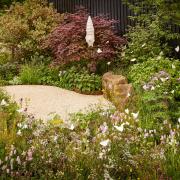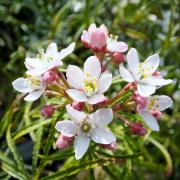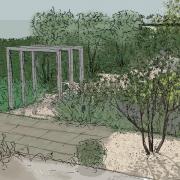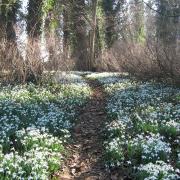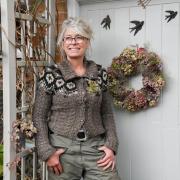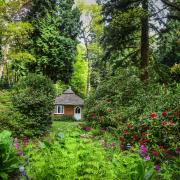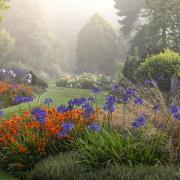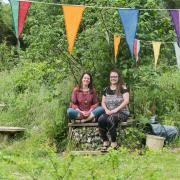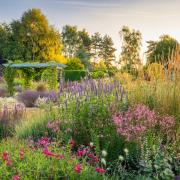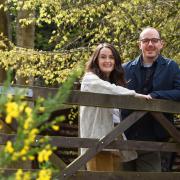The Royal Horticultural Society has inspirational gardens across the country – but the landscape where its president is most at home is in Norfolk

As visitors wander through the glorious gardens surrounding Raveningham Hall they might see a gardener hauling brambles out of a thicket, weeding a bed of perennials, or watering the veg. Some stop for a chat, or call the man over to ask about a particular plant.
“One Sunday some people said it was hard to have to be working, and I told them that the owners were terribly tough!” says Sir Nicholas Bacon.
Sir Nicholas, whose family have lived at Raveningham, in the Waveney Valley, for almost 300 years, often spends his weekends gardening. It’s a passion he inherited from his mother, Priscilla, whose drifts of snowdrops and agapanthus, and overall design for the gardens around the 18th century hall, still light up the grounds.
He began growing things as a little boy, alongside his mother, and today looks after her horticultural legacy as well as his own projects and passions. One of his first jobs was helping take the cut flowers and veg from the estate’s horticultural business to Norwich shops and stalls. As soon as he could drive he became the delivery boy. “We grew 20,000 chrysanthemums here,” he says. “They went to Covent Garden, Leeds, all over.”

Today the produce from Raveningham’s walled Victorian vegetable garden is used in the tearooms (where those same visitors who chatted to Sir Nicholas in the garden, might see his wife, Susan, helping with the washing-up.)
Raveningham gardens are not just about plants. They are studded with sculptures, many of them created by Susan, who also designed the medicinal herb garden, and the Time Garden which honours the family’s illustrious Elizabethan ancestor Sir Francis Bacon, who wrote essays based on the passage of time.
“I think people garden because their parents or grandparents inspired them and showed them what to do,” says Sir Nicholas. “My mother was a passionate gardener.” There are snowdrops, an agapanthus and a fuschia named for Lady Priscilla Bacon – as well as the hospice she helped found in Norwich.
“I think I’m a more shrubby person, and anything to do with trees,” he says. And he even loves fallen trees – creating a fascinating stumpery in part of the gardens. Four upside-down oak trunks stand guard at the entrance, with ferns sprouting from their upturned roots. Beyond them around 200 gnarled stumps fling roots and branches out, merging into tall ferns planted beneath a canopy of living trees.
He also has a plot which he hoped to pack with so many perennial plants, grown from seed, that it would not need weeding. This has not gone to plan – and he has had to allow the team of four estate gardeners to help out.
Sir Nicholas trained as a barrister, but worked as what he describes as a “serial entrepreneur – some businesses didn’t work out, some did,” until taking over at Raveningham. The 5,500-acre estate is mainly farmed, with crops including oil seed rape, wheat, barley, sugar beet, peas and potatoes, plus cattle and sheep. This spring Sir Nicholas finished several years as chairman of the Royal Norfolk Agricultural Association. He is also president of Britain’s leading gardening charity, the Royal Horticultural Society. This unpaid role takes a significant chunk of each week but Sir Nicholas loves it. “One is immensely privileged to be in the RHS at a time of enormous development,” he says. It has show gardens around the country, runs the Chelsea Flower Show and other top garden shows, offers gardening advice and qualifications and is currently raising many millions of pounds for a fifth national garden in Salford.
And although he has spent much of his life gardening at Raveningham, he is in awe of the gardening genius of his fellow RHS members. “When you have spent the whole of your life breeding daffodils or tulips, your knowledge is immense.
I’m not in the same league at all,” he says.
However, his horticultural know-how is impressive. Like most keen gardeners, he is an expert in his own domain – and deeply rooted in the quiet parkland with its lake and lawns, rose garden and wildflower meadow, exquisite walled garden abundant with flowers and fruit, vegetables and salads and complete with Victorian conservatory flanked by vine house, melon pits and fig house. At the heart of it all is majestic Raveningham Hall.
Sir Nicholas is officially the Premier Baronet of England, meaning the family baronetcy of Redgrave can be traced back further than any other in the country. “You plant an oak tree today and it will take six generations for it to mature,” says Sir Nicholas, who is today reaping rewards from his forebears as well as creating landscapes for his heirs. He and Susan brought up four sons at Raveningham and now there is a grandchild too.
Sir Nicholas, 65, is already planning his retirement – gardening of course, but on a smaller scale, with a little plot of flowers and vegetables.
When visitors happen upon Sir Nicholas in the gardens they might not immediately realise he is both lord of the manor and gardener, but if they get chatting the game must be up. As a child Sir Nicholas was a page-boy to the Queen, and is a friend of Prince Charles – who appointed him lord of the tin mines of Devon and Cornwall (or, officially, Lord Warden of the Stannaries.) And he has picked up a few tips from another royal horticultural institution. Prince Charles famously talks to his plants – and so does Sir Nicholas.
No wonder Raveningham Gardens look so ravishing.
This month Raveningham Gardens and tearoom will be open Wednesdays, Thursdays, Fridays and Sundays from April 3-26, plus Easter Sunday and Monday. raveningham.com








